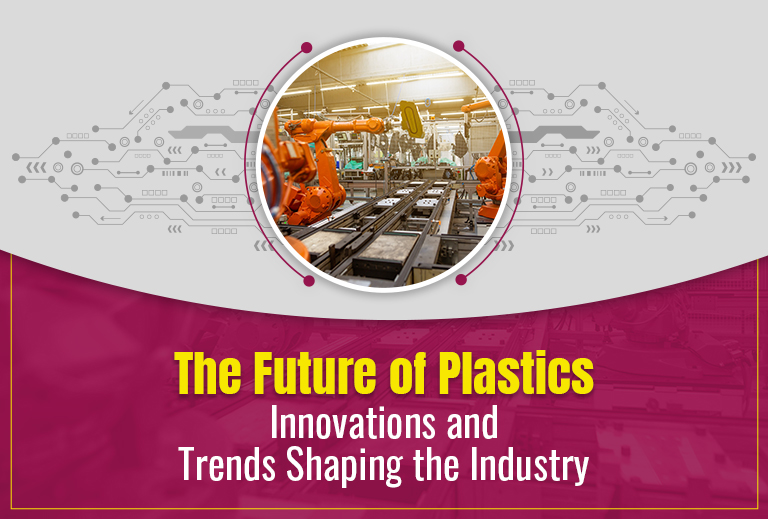The Future of Plastics: Innovations and Trends Shaping the Industry
Plastics have revolutionized numerous industries and our daily lives with their versatility, durability, and affordability. As we look toward the future, the plastics industry is undergoing a transformation, with a focus on developing eco-friendly alternatives, recycling technologies, and circular economy models.
This article will explore the innovations and trends shaping the future of plastics.
The rise of bioplastics
Unlike traditional petroleum-based plastics, bioplastics are derived from renewable resources such as plants, algae, or even waste products. These materials can be biodegradable, compostable, or have a reduced carbon footprint.
Innovations in bioplastic production techniques have enabled the creation of a wide range of applications, from packaging materials to automotive components. The future of plastics will likely see increasing adoption of bioplastics as a viable alternative to conventional plastics.
The increasing depth of recycling technologies
Traditional plastic recycling processes often face limitations due to the complexity of plastic compositions, contamination, and high energy requirements. However, researchers and entrepreneurs are actively developing advanced recycling technologies to overcome these challenges.
One such innovation is chemical recycling, which breaks down plastic waste into its molecular components, allowing for the production of new plastics with properties comparable to virgin materials.
The shift toward a circular economy model
A circular economy model emphasizes the reduction, reuse, and recycling of plastics to minimize waste and maximize resource efficiency. Designing products with end-of-life considerations in mind and implementing effective recycling infrastructure are key aspects of this model.
Moreover, the concept of extended producer responsibility (EPR) is gaining traction, whereby manufacturers are held responsible for the entire lifecycle of their products, including their proper disposal and recycling.
3D printing as a transformative technology
3D printing allows for the creation of complex and customized objects, reducing the need for traditional manufacturing processes that often generate significant waste. By utilizing bio-based or recyclable materials, 3D printing can contribute to a more sustainable and resource-efficient future.
This technology also enables the development of innovative applications, such as 3D-printed prosthetics and construction components, showcasing the potential of plastics in various industries.
Mark your calendar for Plastivision 2023, where you can delve into the futuristic trends shaping the plastic industry. Join us from December 7th to 11th at the Bombay Exhibition Centre in Mumbai to connect with the industry’s top professionals. This event offers a unique opportunity to network with brilliant minds, exchange ideas, and explore the latest advancements in the plastics sector. Don’t miss out on this exciting event! We look forward to seeing you there.
Leave a Reply Cancel reply
Recent Posts
- Understanding The Materials That Are Used To Build Plastic Toys
- All You Need To Know About Food-grade Plastics
- A Glance At The Materials That Boost The Performance Of Plastics
- Understanding The Importance Of Exploring New Business Opportunities In The Plastic Industry
- Understanding The Importance Of Investing in R&D For The Plastic Industry
Categories
- 3D Printing
- AIPMA
- Automation
- Automobile Sector
- Bio Plastics
- Environment
- Innovations In Recycling
- Latest Innovations
- Molds & Dies
- News
- Packaging Industry
- Plastic
- Plastic Application
- Plastic Industry
- Plastic Market
- Plastic Myths
- Plastic News From The World
- Plastic Packaging
- Plastic Products
- Plastic Recycling
- Plastic Solar Cells
- Plastic Toys
- Plastic Waste
- Plastic World
- Plastics
- Plastics And Their Applications
- Plastics In Agriculture
- Plastics In Healthcare
- Plastics In Medical Industry
- Plasticulture
- Processing Machinery
- Recycling Machines
- Robotics
- Uncategorized
- Virtual Reality
Archives
- November 2023 (3)
- October 2023 (2)
- September 2023 (3)
- August 2023 (3)
- July 2023 (3)
- June 2023 (3)
- May 2023 (2)
- April 2023 (2)
- March 2023 (2)
- February 2023 (2)
- January 2023 (2)
- December 2022 (3)
- November 2022 (1)
- October 2022 (1)
- September 2022 (2)
- August 2022 (1)
- July 2022 (3)
- May 2022 (3)
- March 2022 (2)
- February 2022 (1)
- January 2022 (1)
- September 2021 (2)
- August 2021 (3)
- July 2021 (4)
- June 2021 (4)
- May 2021 (3)
- April 2021 (2)
- March 2021 (4)
- November 2019 (8)
- October 2019 (8)
- September 2019 (8)
- August 2019 (8)
- July 2019 (8)
- June 2019 (8)
- May 2019 (8)
- April 2019 (8)
- March 2019 (8)
- February 2019 (11)
- January 2019 (8)
- December 2018 (8)
- November 2018 (12)
- October 2018 (12)

